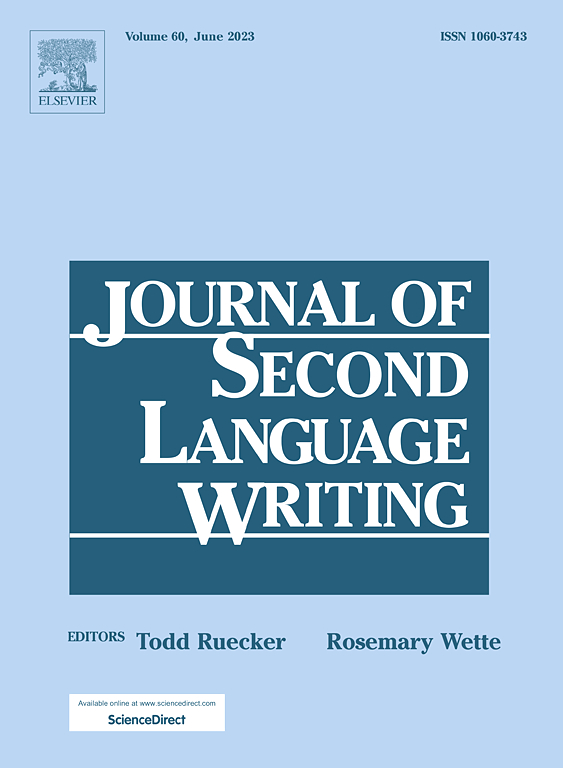研究第二语言作者在人工智能辅助写作中的关键人工智能素养:一个APSE模型
IF 4.5
1区 文学
Q1 LINGUISTICS
引用次数: 0
摘要
虽然在二语写作者中培养批判性人工智能素养(CAIL)的必要性已经得到越来越多的认可,但提供将CAIL整合到二语写作中的实证模型的研究仍然有限。为了对人工智能辅助第二语言写作和CAIL的持续研究做出贡献,我们设计了当前的研究,以了解学生如何使用ChatGPT(一种流行的生成人工智能技术)来支持他们的写作,并在美国的两个一年级写作课程中发现他们的CAIL。采用定性案例研究设计,我们分析了学生的面试数据、书面反思、人工智能日志以及学生与人工智能互动的视频。调查结果显示,学生们以各种方式利用人工智能,包括选题和头脑风暴、提纲、修改、编辑和来源。我们基于使用ChatGPT时在学生CAIL中发现的四个维度提出了一个APSE模型:(1)对AI的批判性意识(A),(2)批判性位置性(P),(3)与AI互动的关键策略(S),以及(4)对AI功能的批判性评估(E)。该模型突出了CAIL中不同但重叠的组成部分,并解决了第二语言作者在批判性地利用生成式AI的语言和修饰资源时面临的具体问题。教学意义包括对CAIL的明确指导,培养学生的人工智能反馈素养,培养沟通和评估的元技能,以及提高他们的人工智能辅助自主学习技能。本文章由计算机程序翻译,如有差异,请以英文原文为准。
Investigating L2 writers' critical AI literacy in AI-assisted writing: An APSE model
While the need to foster critical AI literacy (CAIL) among L2 writers has gained increasing recognition, research offering empirically grounded models for integrating CAIL into L2 writing remains limited. To contribute to the ongoing research in AI-assisted L2 writing and CAIL, we designed the current study to understand how students used ChatGPT, a popular generative AI technology, to support their writing and to uncover their CAIL in their writing practices in two first-year writing classes in the US. Adopting a qualitative case study design, we analyzed students’ interview data, written reflections, AI logs, and screencasts of students’ interactions with AI. Findings show that students utilized AI in various ways, including topic selection and brainstorming, outlining, revising, editing, and sourcing. We propose an APSE model based on four dimensions identified in students' CAIL while using ChatGPT: (1) critical awareness of AI (A), (2) critical positionality (P), (3) critical strategies for interacting with AI (S), and (4) critical evaluation of AI affordances (E). The model highlights the distinct yet overlapping components of CAIL and addresses specific concerns that L2 writers face to leverage generative AI’s linguistic and rhetorical resources critically. Pedagogical implications include explicit instruction on CAIL, developing students’ AI feedback literacy, fostering meta-skills in communication and evaluation, and enhancing their AI-assisted self-directed learning skills.
求助全文
通过发布文献求助,成功后即可免费获取论文全文。
去求助
来源期刊

Journal of Second Language Writing
LINGUISTICS-
CiteScore
8.80
自引率
13.10%
发文量
50
审稿时长
59 days
期刊介绍:
The Journal of Second Language Writing is devoted to publishing theoretically grounded reports of research and discussions that represent a significant contribution to current understandings of central issues in second and foreign language writing and writing instruction. Some areas of interest are personal characteristics and attitudes of L2 writers, L2 writers'' composing processes, features of L2 writers'' texts, readers'' responses to L2 writing, assessment/evaluation of L2 writing, contexts (cultural, social, political, institutional) for L2 writing, and any other topic clearly relevant to L2 writing theory, research, or instruction.
 求助内容:
求助内容: 应助结果提醒方式:
应助结果提醒方式:


